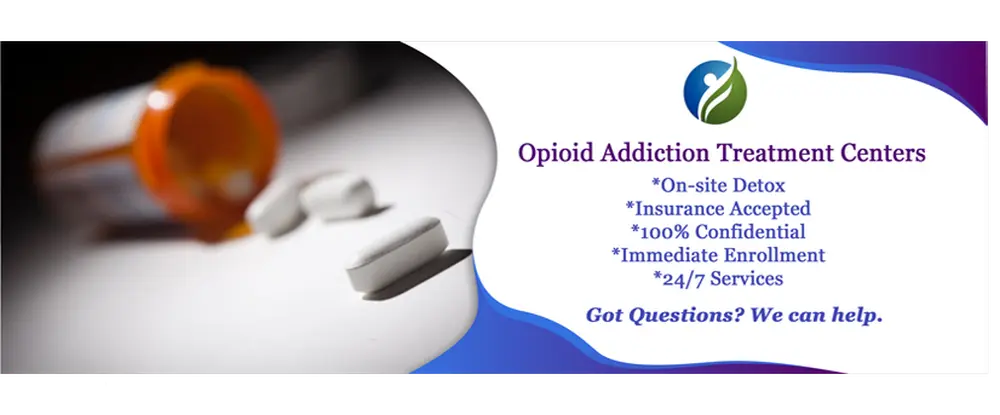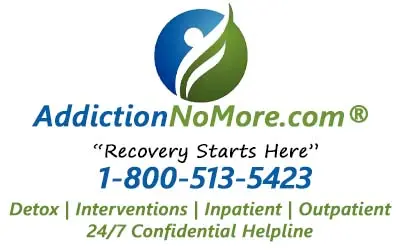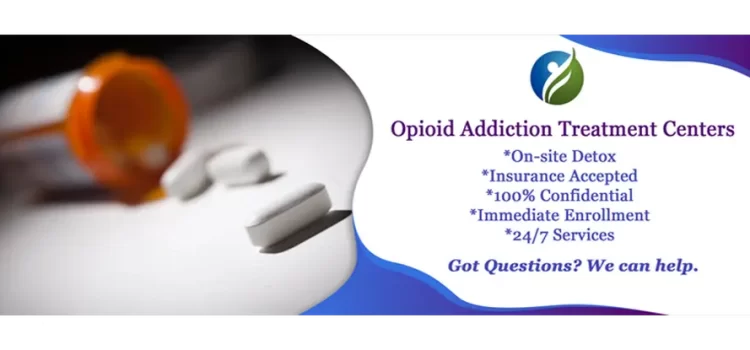Opioid Addiction Treatment Centers in Ohio
Opioid addiction is a chronic medical condition (a disease or condition that lasts for at least three months and may worsen over time). Prolonged use of opiates can create long-term changes in your brain. Getting help from Opioid Treatment Centers in Ohio can help you avoid some of the long-term health conditions associated with addiction to opioids. It can often take much more than willpower alone to break free of prescription drug misuse, but you can escape the cycle of detox and relapse. It may be a long-term process, but medications and counseling can improve your chances of success. Heroin and street fentanyl are also opioids, and addiction to them is treated similarly to prescription drug addiction.Discovering that someone you love has grown addicted to something prescribed by a doctor can be a surprise to some of us, but unfortunately, it happens more often than you think. Addiction to painkillers is becoming way too commonplace in the state of Ohio and throughout the entire country. This opiate problem is gaining epidemic status in most of the United States.
Please contact us by phone for immediate assistance. This is a necessary step in beginning the recovery process for yourself or for a loved one. Our addiction treatment specialists and staff have over 25 years of experience in helping people find effective and affordable treatment for all addictions. What you tell us is completely confidential. We are HIPAA compliant. We are here to answer your questions and to get you (or a loved one) into treatment today. If you or a loved one is struggling with addiction to pain medications and is in need of help to start the process of getting into a detox center and or treatment program that is medically and medication-assisted, give us a call before it is too late. For immediate intake, call us now.
1-800-513-5423
What you will learn:
What is opioid use disorder (OUD)?
Signs of addiction to opioids, painkillers, or narcotics
Opioid Detox Centers in Ohio
Medically Assisted Opioid Detox Centers in Ohio
Rehabilitation Centers for Addiction to Opiates in Ohio
Private Rehabilitation Centers
Find Drug Rehabs Near Me
Can I use my insurance to cover detox and treatment?
Types of Opiates
Withdrawal symptoms and risks of dependency
How to tell if I have OUD (Opioid Use Disorder)
Holding a Professional Intervention for a Loved One
How We Can Help
List of Local Detox Centers in Ohio
Ohio Opioid Addiction Statistics
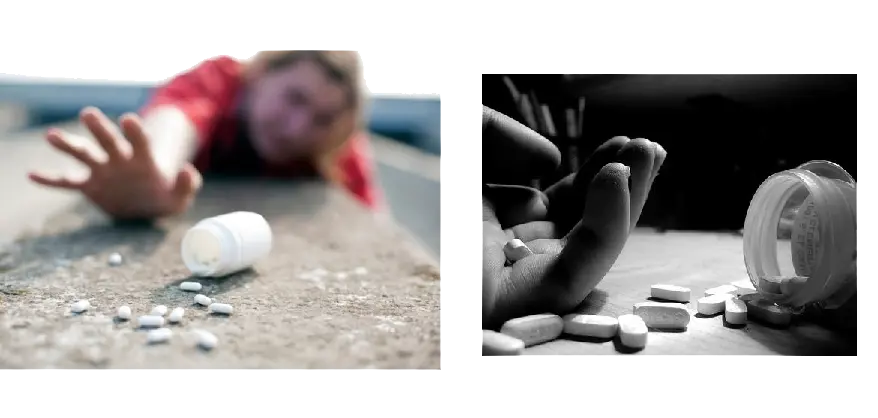
What is opioid use disorder (OUD)?
Opioid use disorder (OUD) means that you have a problematic pattern of using opioids. The pattern causes a lot of distress and impairment (meaning that it causes problems in and interferes with your daily life). Instead of OUD, sometimes people use the terms “opioid dependence” and “opioid addiction.” Dependence means feeling withdrawal symptoms when not taking the drug. Addiction is a chronic brain disease that causes a person to compulsively seek out drugs, even though they cause harm.The risk of OUD is higher if you misuse the medicines. Misuse can include taking more than your prescribed dose or taking it more often, using it to get high, or taking someone else’s opioids.
Opioid use disorder and overdoses are serious public health problems in the United States. As more people misuse opioids, more women are misusing opioids during pregnancy. This can lead to health risks for the mother and baby. The baby may be born with neonatal abstinence syndrome (NAS). NAS is a group of withdrawal symptoms that a baby has after being exposed to drugs during pregnancy.
Another problem with increased opioid misuse is that it can also lead to more heroin use. There are some people who switch from prescription opioids to heroin because heroin may be cheaper and easier to get.
Signs of addiction to opioids, painkillers, or narcotics
For most people, the progression from taking medications for pain or some other condition to using more of the same medications to handle the same condition can be gradual and almost unnoticeable. There is a myriad of signs that can point out that there may be a problem. Dependency usually starts with someone needing more of the opiates to do the same desired effect or an increased intolerance to the drug. Once a person finds themselves dependent on opioids, there is usually an increased aggressive behavior in the individual once the medication starts to wear off. Another sign of opioid dependency is frequent bouts of the flu or flu-like symptoms, a common side effect if the person does not take their required dose before withdrawal sets in.Symptoms of Opioid withdrawal can include hot and cold sweats, fever, increased heart rate, convulsions, seizures, vomiting, aching muscles, and stomach pain or cramps. If you have any of these symptoms or have someone you love with these signs of opioid withdrawal, please seek professional treatment immediately. Being admitted into a medicated detox program in Ohio is the first step. We can help you find a free medical detox center or a private treatment program that takes your insurance. Call us now to find out what your options are in and outside of the state of Ohio. For immediate placement into treatment for opioid and painkiller addiction in Ohio, call now.
1-800-513-5423

Opioid Detox Centers in Ohio
When searching for an opioid treatment program, it is important to find out if they have or are associated with a medically assisted detox center in Ohio that specializes in narcotics, opioids, and painkillers. Finding a list of medically assisted detox centers in Ohio is an important first step in the recovery process. A detox center requires a medical staff and a doctor to prescribe life-saving medications, to properly and safely detoxify someone from opioids.When entering into an opioid detox center in Ohio, it is important to be very honest about your usage habits and the different medications that you are taking. Once you have decided to enter into a detox program for opiate and or opioid addiction, you need to make sure that you have a follow-up program set up for when you are discharged. Opiate detox is the first step in recovery and in no way a substitute for actual treatment at an inpatient rehabilitation center for opioid and prescription medication abuse in Ohio.
Medically Assisted Opioid Detox Centers in Ohio
When someone has found themselves dependent on their pain medications and cannot quit on their own, the first thing they think of is getting a detox to handle their addiction. Detox centers in Ohio that handle opiate and opioid addiction are not a substitute for the actual treatment. Doing a detox program is an important first step to take in the battle to be addiction-free. Once you handle the initial physical addiction, the next step is to follow up with a treatment program to handle the mental side of the addiction. We can help you find treatment options and explain the differences between program philosophies and give you a better understanding of the differences in various program philosophies.
Rehabilitation Centers for Addiction to Opiates in Ohio
Opioid treatment centers provide drug rehabilitation and detox programs for those seeking life without the need for their addiction to painkillers. If you or a family member has started to run out of their medications earlier than expected or find they need more of the same medication to handle the same pain, you may need help with an underlying addiction problem.There are really only 2 types of treatment available for opioid addiction. Many programs offer inpatient settings where you enter into a program for a set amount of days and complete the program. The other is an outpatient program where you live at your house or in a sober living setting and attend treatment either daily or weekly for a set amount of days. There are variations of these programs that can vary in length and philosophy. The most common treatment program for opioid addiction is a long-term residential treatment program. Long-term inpatient opioid rehab centers are defined as programs that consist of a treatment plan in an inpatient program for 60 days or longer. These programs for addiction to opioids can be very different in philosophies. Some can have a religious component to their addiction treatment center’s philosophy. Others are more secular in philosophy. Most people who go to a long-term inpatient addiction rehab center will want an individualized program structured to specifically target the problem areas in their lives.
Short-term opiate inpatient drug rehab centers in Ohio usually consist of a program that is anywhere from 21 days to 30 days in treatment. This is started after the detoxification part of the program has been completed. Most programs that offer short-term recovery programs will have an aftercare program once treatment is completed for continued care in your hometown. For those who cannot take time off for 3 months to handle an addiction to opioids, the short-term inpatient program is a great alternative for treatment. Most insurance providers will cover a large portion of the cost associated with a short-term treatment program once the copay has been met.
Many people find themselves increasingly dependent on a medication that was prescribed by their family doctor. Addiction to opioids, opiates, and pain medications can be a very private addiction that is easy to hide in the beginning. Being addicted to pain medications can lead to many bad choices that can have life-changing consequences. Opioid treatment facilities and detox centers in Ohio are not always easy to locate or be admitted into. It is sometimes beneficial for the client to go to treatment further away from home. Getting away from temptations and friends who may still be using is often better for many people. Clients who go to rehab in another state also have a harder time leaving treatment early as well. Depending on the situation, our counselors may suggest looking for substance abuse programs that are a plane flight away.

Private Rehabilitation Centers
If you are looking for a private inpatient opioid recovery center in Ohio, there are many options in and outside of the state for your recovery to start. Luxury or executive treatment centers can offer different types of therapy compared to conventional rehabilitation programs. these programs understand that Some people would like to remain quiet about their dependency on pain medications. For those people, we recommend going a plane flight away to avoid any chance encounters that could expose your dependency.Find Drug Rehabs Near Me
We can help you locate treatment for addiction in your area or anywhere in the country. To locate AA meetings, group meetings, 12-step programs, inpatient treatment, or outpatient services in your town, give us a call. There are many options for drug rehab services in many cities in Ohio.1-800-513-5423
Akron, Ohio Drug RehabsCincinnati, OH Addiction Treatment
Cleveland, Ohio Drug & Alcohol Rehabilitation
Columbus, Ohio Substance Abuse Treatment
Dayton, OH 30/90-Day Treatment Centers
Hamilton, Ohio Inpatient Drug Rehab Programs
Toledo, Ohio Treatment Centers for Addiction
Youngstown, OH Detox Centers, and Rehab Facilities
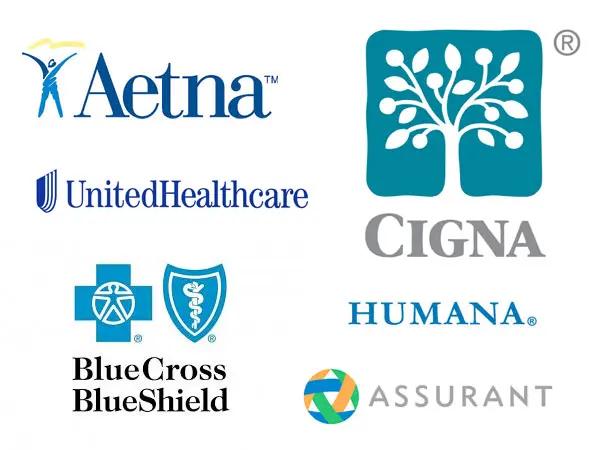
Can I use my insurance to cover detox and treatment?
Our healthcare system is in a constant battle right now, and if they are going to strip pre-existing conditions from policies, it is important to act now before your policy does not have to cover treatment for addiction. As of right now, most insurance plans in Ohio have some coverage for detox and treatment for opioid dependency. Depending on your insurance carrier and level of coverage will determine where, or if, you can receive benefits to enter into a rehabilitation program for opioid addiction in Ohio. Our counselors can verify your coverage for opioid or painkiller detox, usually within a few hours, depending on the time of day. Act NOW before you or someone you love becomes part of the 10’s thousands of casualties of the opioid epidemic each year. If you have private insurance and are looking for a recovery program that is a bit more upscale in its amenities there are many choices in and outside of Ohio. Luxury Detox and private treatment programs are usually located on the coast or a lake to help with tranquility and privacy. Most differences in treatment are purely comforted with some Holistic recovery programs for opioid addiction offering Eastern healing practices coupled with Western addiction programs.
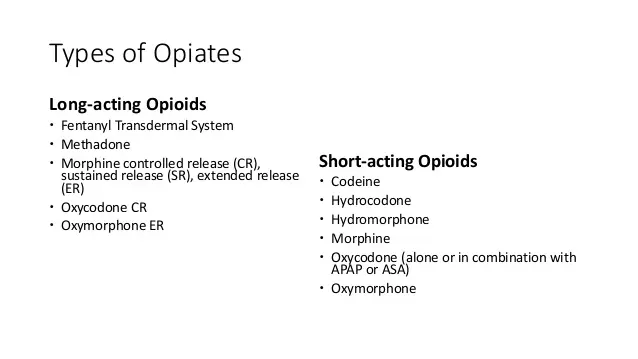
Types of Opiates
Opiates are alkaloids derived from the poppy plant. Opiates can be partially synthetic in makeup and still be classified as opiates. Drugs that are considered opiates include; Heroin, Morphine, Codeine, Thebaine, Oxymorphone, Hydrocodone, Vicodin, Lortab, Lorcet, Oxycodone, OxyContin, Oxecta, Roxicodone, Hydromorphone, Dilaudid, Exalgo.Opiates are mind-altering drugs that are derived from the poppy plant (opium is cultivated from the seed pod). Opium is then synthesized to create 3 separate compounds, and its main use is for the controlling of pain. Morphine is an alkaloid that is found in larger concentrations of plant material and is used most often for medical procedures. Heroin comes from morphine and is very similar in chemical structure. Morphine is highly addictive and, if not taken as prescribed, will cause dependency and withdrawal symptoms.
Thebaine is used to make many synthetic medications, including hydrocodone and oxycodone. Thebaine is one of the most toxic of opium alkaloids. Hydrocodone and oxycodone addiction are some of the main concerns for local officials in the battle to stop the opioid epidemic in Ohio.
Codeine is mainly used as a pain-killer and cough suppressant. Codeine is rarer than the rest of the opiate alkaloids. Codeine is also used in synthetic compounds and other opioid-class prescriptions.
Methadone (Methadose, Dolophine) When taken as prescribed, methadone can be safe and effective in the treatment of both chronic pain and opioid use disorders. When a person starts methadone treatment for opioid dependency, they will take a daily dose of methadone as a liquid or a pill. This will reduce the withdrawal symptoms and cravings for opioids or heroin.
Fentanyl (Abstral, Actiq, Fentora, Duragesic, Lazanda, Subsys) Fentanyl is a very addictive synthetic opioid often prescribed for severe pain and chronic pain sufferers. Anyone who has taken fentanyl for a long period of time understands the downside when developing a dependency on the drug. With fentanyl being found in almost every street drug available on the black market today, the chances of an accidental overdose are very good.
Other Opioids:
Meperidine (Demerol)
Tramadol (ConZip, Ryzolt, Ultram)
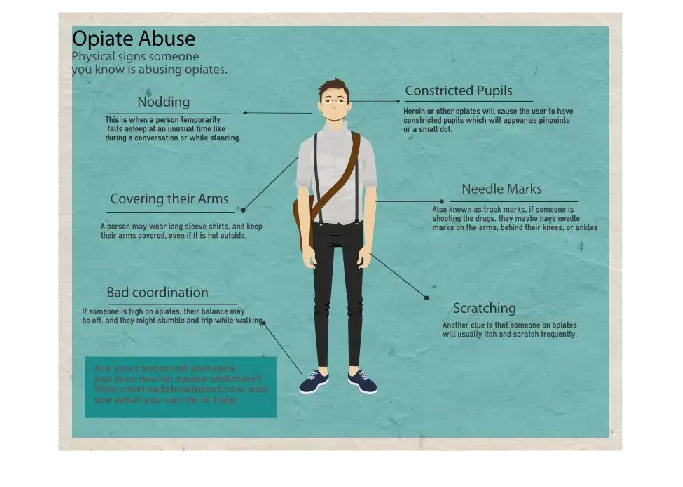
Withdrawal symptoms and risks of dependency
Opioids and opiates are painkillers that are usually prescribed after a traumatic health event. When a person has been prescribed pain medications, there is always a risk for dependency. Most people who find themselves dependent on pain medications have come to this point from a slow progression of having to use more of the same medication for pain relief. At some point, the dependency will systematically turn on pain receptors to emulate the pain in the body in order to get the drug it needs to function. At this point, addiction is a serious possibility, and detox is almost always necessary to manage the withdrawal symptoms that are synonymous with opiate and opioid withdrawal. Withdrawal from fast-acting opiates and opioids can start after 12 hours from the last dose, and long-acting opioids sets in after 30 hours. After 36-48 hours, withdrawal is at full peak and can last for 48-72 more hours, depending on the use amount and severity of the addiction.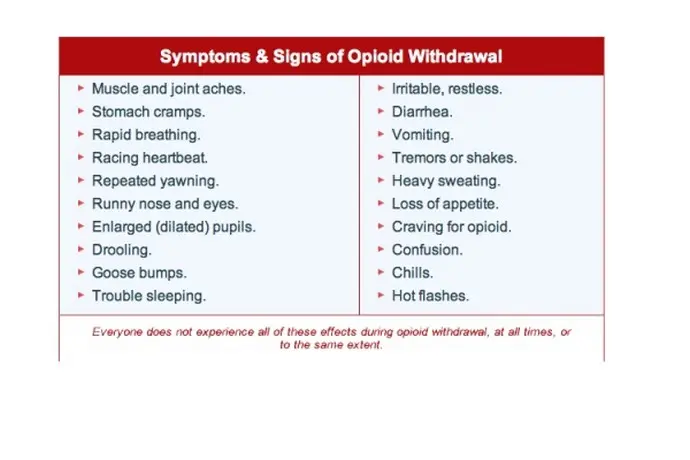
How to tell if I have OUD (Opioid Use Disorder)
STAGES OF OPIATE AND OPIOID WITHDRAWAL: Early withdrawal symptoms can include drug cravings, sweats and fever, muscle aches and spasms, anxiety, increased blood pressure, and sleep deprivation. The early stages of withdrawal from opioids can cause mood swings and restlessness.Stage 2 withdrawal symptoms can emulate flu symptoms. nausea, vomiting, diarrhea, goosebumps, shivering, cold sweats, depression, severe stomach cramps, and muscle pain coupled with sleep deprivation.
Holding a Professional Intervention for a Loved One
Opioid abuse, painkillers, and opiate addictions often require a professional intervention team. Addiction to narcotics such as painkillers is a progressive addiction and sometimes can be hiding right under the surface of the individual. Intervention specialists in Ohio have made thousands of families whole again and free from addiction. Most interventions for opioid addiction and dependency are successful only when a professional is called in to help, hold, and train the family how to properly handle someone who is addicted to their pain medications. Family-held interventions are the best option for someone who is in denial about their addiction to their pain medications.
How We Can Help
If you would like any further information regarding the programs listed above, give us a call, and we will get you pointed in the right direction. Do not wait to seek help for addiction to opiates. Opioid addiction and withdrawal can be deadly. We can help you find many types of treatment and detox for opioid abuse immediately. Our trained counselors will help you find the best therapy model for your specific circumstances and beliefs. Call us toll-free, and we will get you all the information that you will need to get into a program now.1-800-513-5423

List of Local Detox Centers in Ohio
Below, we have listed a few detox centers in various cities around the state of Ohio to help you. If you are looking for a detox program in your city that is not included on this list, please contact us directly free of charge, and we can help you get into detox for opioid and opiate dependency.1-800-513-5423
Oriana House Akron, Ohio
The Oriana House offers detox and treatment for alcohol and drug addiction. The program includes the option for a residential short-term treatment program, Medical detox from opioids, pain medications, and benzodiazepines.
Oriana House
15 Frederick St
Akron Ohio 44310
Gateway Rehab, The Neil Kennedy Recovery Center
Gateway of Austintown, Ohio, offers residential short-term treatment options as well as outpatient aftercare and primary treatment. Working with the state to battle opioid addiction rates, this program offers a medically supervised and medication-assisted detox protocol for opioid dependency.
Gateway Recovery center
5211 Mahoning Ave Ste 370
Austintown Ohio 44515
The Exodus Program (Urban Ounce Prevention Center)
The Urban Ounce Exodus Program is a social detox center and rehabilitation program located in Akron, Ohio. This program uses a sliding fee scale to determine the cost, if any, for treatment services. The program also accepts most insurance plans and access to state-issued recovery vouchers. Programs include residential medical detox, intensive outpatient treatment programs, and a hospital inpatient treatment program.
Exodus Program
1735 South Hawking Ave
Akron Ohio 44320
Crossroads Counseling Center
The Crossroads Treatment Programs include a residential long-term treatment program, inpatient short-term drug rehab, residential medicated detox program, intensive outpatient treatment programs, and drug and alcohol prevention and support programs. This program offers treatment for opioid addiction in teens and adults at separate facilities. Those needing a medical detox from prescription medication abuse in Bellaire can have the option of medication step-down programs in an outpatient detox program or go to the center and detox in a medically supervised detox facility.
Crossroads Counseling Services
3201 Belmont St
Bellaire Ohio 43906
Behavioral Connections All Women’s Program for Opioid Addiction
Behavioral Connections has an all-women’s treatment program for those who would prefer to be in treatment with only women in Bowling Green, Ohio. The All Women’s Treatment Center for addiction to drugs or alcohol is working to help handle the opioid epidemic. This program is for women who do not feel comfortable going into treatment for addiction in a co-ed facility. The Behavioral Connections Women’s Drug and Alcohol Treatment Center offers intensive residential long-term treatment programs for women, short-term inpatient treatment programs for prescription medication abuse, and detoxification in a medically supervised detox facility.
Behavioral Connections Women’s Treatment Center
WALK-IN ASSESSMENT CLINIC
Tuesday & Friday
8 a.m. – 5 p.m.
1010 N. Prospect
Bowling Green, OH 43402
The Center for Chemical Addiction Treatment
The Center for Chemical Addiction and Treatment is primarily a medical detox center and a 30-day inpatient treatment program. The program includes specialized treatment plans for seniors who are dependent on their pain medications. Treatment and program offerings vary depending on the addiction level and are done on a case-by-case basis.
Payment for treatment services includes most private insurance carriers and sliding fee scales for those who qualify.
Center for Chemical Addictions Treatment
830 Ezzard Charles Drive
Cincinnati Ohio 45214
Ohio Opioid Addiction Statistics
With 11 states now making PDMP (Prescription Drug Monitoring Programs) mandatory for medical practitioners and pharmacists, the eventuality of the rest of the country following suit is drawing near. Once the system is implemented, it is quite possible thousands of people in Ohio will be finding themselves under investigation or, at the very least, cut off from their supply of pain medications.
Drug Abuse Stats and Chart provided by Drugabuse.gov
Ohio, being one of the states hit the hardest by the recent opioid epidemic, has now become one of the top 5 states with the most opioid-related deaths for 2016. At a rate that is more than 2 times the national average of 13.3 deaths per 100,000 people, Ohio reported that 32.9 people die out of every 100,000 people in the state from an opioid-related overdose. The greatest number of deaths are coming from synthetic opioids like Fentanyl, then heroin-related incidents, followed by RX medication overdoses. It seems that the illegal drug trade is the real problem that needs to be addressed next in the state. Fentanyl accounted for more deaths than all other opioids combined in 2016, and the trend is continuing through 2019.
Addiction to pain medications can have serious life-ending consequences. Please seek help as soon as possible if you are experiencing withdrawal symptoms from not taking your medications. The latest study shows that a person can become addicted to their pain medications if they do not take them as directed in as little as 5 days. With more people having to get illegal synthetic like opioids or fentanyl to help manage their withdrawal symptoms, there has been an increase in overdose rates. Drugs you get off of the street vary in purity levels, and one small mistake in cutting the drug can lead to dozens of deaths a single night alone.
Sources
Opioid Use Disorder
NIDA
OUD
Opioid Addiction
DHHS Opioids
Erik Epp – Content Author
